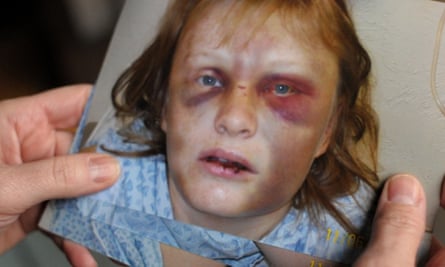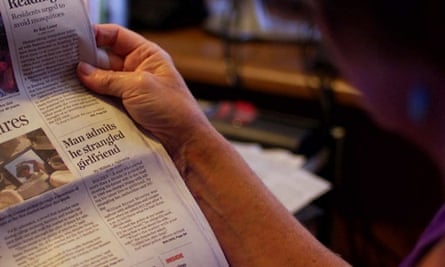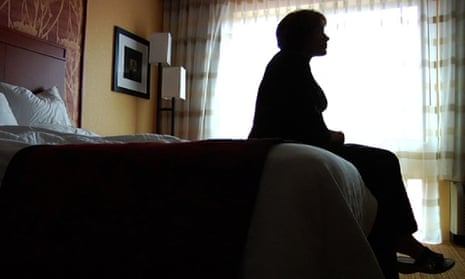Warning: this article contains graphic images and content.
Deanna Walters is making grown men cry. As a domestic abuse survivor, she is in a therapy group facing a group of men who have battered their wives. They are undergoing 26 weeks of therapy. Walters passes around photos of her face after her ex-husband beat her with a heavy flashlight for leaving him. Her features are barely visible in a face bruised dark purple and blue and pink. The men break down into tears.
“Three of them cried,” she says, recounting her second trip to the therapy group. Her reasons for being there? To better understand the ex-husband who almost killed her six years ago. Walters is interning to shed some light on why domestic violence occurs and to share the different ways abusers rob their victims of powers.
Walters, like many spousal abuse survivors, is lucky to be alive. She separated from her husband early in 2008. Then she agreed to meet him on Halloween to take their two-year-old daughter, Martina, trick or treating.
The night, however, took a horrifying turn when her ex-husband Robbie Howell kidnapped them and kept them imprisoned in his truck, beating Walters close to death with a Maglight flashlight.
“He got even with her for separating from him by almost beating her to death,” says Kit Gruelle, domestic violence advocate who worked with Walters on her case.
In a big picture of domestic violence assaults, Walters is just one of many statistics. One in four women will at some point in their life be beaten or abused by someone in their home. About 4,000 of them die each year, with 75% of them getting killed when they try to leave or after they’ve left the abuser.
More than just bruises
Physical abuse like what Walters experienced is just one of the tools that abusers favor. Most of the work is psychological. Absusers make women feel worthless, belittle them and make sure they never have enough money of their own to escape.
When her ex-husband beat her with the heavy flashlight, Walters was trapped in the cabin of his truck, with no way to escape, no money on her and no phone.

To her, it was deja vu. Back when they were still together, she would often find herself without a dollar to her name.
“If I worked, he would take my money. He was in charge of everything. I never knew from day to day how much money we had in the bank, what the money was spent on,” Walters says of her relationship with her ex-husband. “I didn’t even know he was using drugs, until we were on the truck. I didn’t know what the money was spent on. I didn’t even know if our bills were being paid.”
Emotional, physical and financial abuse often go hand in hand, says Peggy O’Neil, executive director at Women’s Information Services, WISE.
Abusers often wipe out shared bank accounts, ring up debt on shared credit cards, ruin their victim’s credit scores or attempt to bury them with excessive legal and divorce fees that often eat up most of the victim’s assets.
“Economic abuse is literally keeping money from a woman so that she doesn’t have access to any finances. She doesn’t have access to bank account, to any knowledge about the financial situation,” explains O’Neil.
The fear of being left without any means can often leave victims paralysed and trapped in an abusive relationship.
“It’s one of the primary ways that abusers will exert control, by controlling that pocket book,” says Cynthia Hill, whose documentary Private Violence tells stories of abuse.

[The victim] is afraid. She is afraid that if she does leave, how is she going to feed her children? Maybe he’s got the health insurance. How is she going to go to the doctor if she leaves or take her children to the doctor? There are so many things that when you are thinking about the complexities of those relationships that we just don’t see. We don’t see that kind of an abuse. That’s not a black eye – that we can see.”
For example, one of the women helped by WISE was limited to a quarter tank of gas by her abusive husband.
“She literally couldn’t leave the farm they lived on,” says O’Neil. In the end, the woman ended up siphoning gas from various farm equipment until she had enough to get away while her husband was out in the field one morning.
The economic abuse frequently extends into the workplace, where some victims receive threatening calls from their abusive partner. Some are late – or have to skip workdays altogether – due to injuries from abuse. Others have to hurry home as soon as the clock strikes five, for the fear of inciting feelings of jealousy in their partner. As a result, victims of abuse often struggle to keep their jobs and to advance in their careers.
An equal opportunity crime
Not all victims of domestic violence are poor, but nearly all are denied access to their family’s money. Domestic violence doesn’t afflict just particular income classes. It’s an equal-opportunity crime.
“It’s not even a stereotype. It’s a flat-out myth,” O’Neil says of the belief that lower-income households are more prone to experience spousal abuse.
Victims of domestic abuse, who are in a higher income bracket, believe they have more to lose and are less likely to call the cops. Furthermore, abusers are smart about when they exercise control over their victims.
“They are not doing it in public. They are doing it behind the closed doors. It’s crazy-making,” explains O’Neil. “You think you are losing your mind. Who is going to believe you? Because he could be someone who is the bank president, a professor or a doctor, someone who has status in the community.”
Abusers can be so convincing in their campaign of torture and cutting off partners from resources that victims often blame themselves for years. Abusers blame the victims too, often for imaginary slights: “she cheated on me,” or “she was a whore,” or “she spends our money.”

“Abusers don’t have to victim blame us. We blame ourselves,” Walters says. It can take up to three-hour-long therapy sessions before abusers start to consider that they are really at fault.
Earlier in the interview, Walters said she stayed with her ex-husband for close to nine years, despite his constant abuse. “[Blaming ourselves] is hard and it makes it worse. We shouldn’t have to do that, because it’s not our fault,” she says.
“Everybody asks why, but there’s not really one answer to that question. There are a lot of reasons why I stayed and still some that I only think of now.”

Comments (…)
Sign in or create your Guardian account to join the discussion